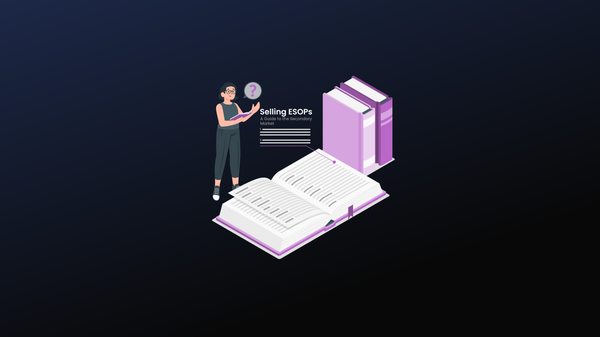What is an ESOP (Employee Stock Option Plan)?
What is an Employee Stock Option Plan (ESOP)
An Employee Stock Option Plan is a contract that gives employees the right to purchase a certain number of shares in the company at a predetermined price, after a specific period. According to an industry report in 2020, over 70% of Indian startups offer ESOPs to their employees.
Summary
An ESOP can be a powerful tool for startups, enabling them to offer employees partial ownership and align employee interests with company goals. In this guide, we’ll explore ESOPs in detail—what they are, why startups benefit from them, and how they help attract and retain top talent.
Related Reading: For a deeper dive into creating your own ESOP policy, read our Step-by-Step Guide to Creating an ESOP Policy for Your Startup.
How Does an ESOP Work?
An ESOP works by granting employees the option to purchase or receive company shares as part of their compensation package. Startups typically use ESOPs to reward long-term commitment, with shares distributed according to a vesting schedule. Here’s a simplified view of how it typically works:
- Grant of Options: Employees are granted options to purchase shares at a specified price.
- Vesting Schedule: Ownership rights accrue over time (often 4 years), incentivizing employees to stay.
- Exercise and Ownership: Once vested, employees can exercise their options, paying a set price per share to officially become shareholders.
ESOPs vs. Traditional Compensation: A Comparative Look
| Aspect | ESOPs | Traditional Compensation |
|---|---|---|
| Reward Timing | Long-term wealth creation potential | Immediate gratification through salary and bonuses |
| Ownership | Provides employees with ownership stake in the company | No ownership; purely cash-based compensation |
| Motivation Alignment | Aligns employee interests with company's success | Focuses on individual performance metrics |
| Cash Flow Impact on Company | Minimal immediate cash outlay | Requires significant cash expenditure |
Take Flipkart, for example. When Walmart acquired a 77% stake in Flipkart in 2018, employees who held ESOPs saw life-changing financial gains. Some became millionaires overnight!
"This is the largest wealth creation opportunity in Indian internet history," said Binny Bansal, co-founder of Flipkart.
Why Do Startups Need an ESOP?
ESOPs are particularly advantageous for startups, allowing them to attract and retain top talent by offering equity instead of high salaries. They help level the playing field, enabling startups to compete with established companies that may offer more traditional benefits.
1: Fostering Ownership and Loyalty Through ESOPs
Imagine having a team where everyone feels like an owner. Sounds amazing, right? ESOPs can make this a reality. When employees have skin in the game, they're more likely to go the extra mile.
As N.R. Narayana Murthy, co-founder of Infosys, famously said:
"Our assets walk out of the door each evening. We have to make sure that they come back the next morning."
ESOPs help ensure that your valuable assets—your employees—are not just returning but are fully invested in your company's future.
2. Enhanced Retention and Motivation
Did you know that companies with ESOPs have significantly lower employee turnover? A study by the National Center for Employee Ownership (NCEO) in 2018 found that ESOP companies have 2.7% lower employee turnover than their non-ESOP counterparts.
When your team members are also shareholders, they're more invested—literally and figuratively—in the company's success. This leads to higher productivity and a stronger commitment to company goals.
Freshworks, a Chennai-based SaaS company that made headlines when it listed on NASDAQ in 2021. The IPO turned over 500 employees into millionaires, thanks to their ESOPs. Founder Girish Mathrubootham emphasised that this wealth creation was a milestone not just for the company but for its people.
"This IPO is not just about Freshworks. It's about all of our employees who have been part of this journey," said Mathrubootham. Source: Times of India
3. Employee Attraction: Appealing to Purpose-Driven Talent
In today’s competitive job market, top candidates are often drawn to roles where they feel they’re contributing to something bigger than a paycheck. Offering equity through an ESOP is highly attractive to those who value ownership and want to actively contribute to a startup’s mission. ESOPs provide a sense of partnership, appealing to candidates who are driven by purpose and see themselves as stakeholders in the company’s vision.
Exploring Types of Employee Stock Ownership Plans
Diving into Various ESOP Structures
Not all stock ownership plans are created equal. Let's break down the options:
Employee Stock Option Plans (ESOPs):
The classic and regulated form in India where employees are given the right (option) to purchase shares at a predetermined price (exercise price) after a specified vesting period. It’s designed to align employee interests with the company's growth and typically involves a vesting schedule to retain talent long-term.
Restricted Stock Units (RSUs):
RSUs are different from stock options, as they grant company shares that vest over time but do not require employees to pay an exercise price.
Though RSUs are a popular equity incentive, they are not considered a type of ESOP under Indian regulations. However, they are used as part of equity compensation packages, often in multinational companies or larger Indian publicly listed firms.
Employee Stock Purchase Plans (ESPPs):
ESPPs allow employees to buy company shares at a discount, usually through payroll deductions over a set period. While also not technically ESOPs, ESPPs are a way to offer employees equity but are distinct in structure and purpose.
Performance Shares:
Performance shares are equity grants based on achieving specific company or individual goals, such as revenue targets or other KPIs. Like RSUs, these are not a type of ESOP under Indian law but are used by some companies as part of their overall compensation package.
For instance, Zomato, a leading food delivery startup, has effectively used a mix of ESOPs and RSUs to attract and retain talent. In 2024, they increased their ESOP pool by 1.2 crore stock options to include more employees as shareholders.
ESOPs vs. Employee Stock Option Schemes (ESOS): Choosing the Right Structure
While ESOPs and ESOS are often mentioned together, there is a subtle distinction. ESOS (Employee Stock Option Scheme) is an umbrella term for any stock option scheme that grants employees the right to buy shares. An ESOP, however, is a specific type of ESOS that is focused on direct employee ownership.
- When to Choose ESOS: If your goal is to include a broader group—such as advisors or board members—in the option plan, an ESOS may offer the flexibility to do so.
- When to Choose ESOPs: For companies looking to build a deep culture of ownership among employees, an ESOP-focused scheme provides a clear pathway to employee shareholding while ensuring that these ownership options grt activated of a period of time called vesting.
Issuing ESOPs in a compliant manner in India
Establishing a compliant ESOP in India requires understanding and adhering to key regulatory guidelines. ESOPs are governed by Section 62 (1)(b) of the Companies Act, 2013 and Rule 12 of the Companies (Share Capital and Debentures) Rules, 2014 for unlisted companies. For listed companies SEBI (Share based Employees Benefits) Regulations, 2014 (‘SBEB Regulations’), and to be followed.
Here are some specific requirements startups must follow:
- Minimum Vesting Period: Rule 12 mandates at least a one-year vesting period to ensure that employees are committed to the company before earning ownership rights.
- Eligibility Restrictions: ESOPs cannot be issued to independent directors or promoters holding more than 10% of the company’s equity, maintaining a focus on employee participation.
- Transferability: The options granted cannot be transferred by the employee or pledged, hypothecated, or mortgaged by the employee
We have created a detailed checklist of requirements specified by Rule 12 of the Companies (Share Capital and Debentures) Rules, 2014 for issue of ESOPs. Click here to download it.
Compliance goes beyond avoiding penalties; it’s a foundation for trust. Meeting regulatory standards signals to employees and investors that your company is committed to transparency and fairness.
Further Reading: For a more comprehensive guide to building a compliant ESOP policy, explore our Step-by-Step Guide to Creating an ESOP Policy for Your Startup.
Crafting an Effective ESOP Policy
Defining Clear Objectives
An ESOP isn't a one-size-fits-all solution. It's essential to align your ESOP plan with your startup's specific objectives. Are you aiming to attract top talent? Retain key employees? Drive performance?
For example, setting a four-year vesting schedule with a one-year cliff can encourage long-term commitment. It ensures employees are in it for the long haul, contributing meaningfully before they reap the benefits.
Clarity here is crucial. According to a KPMG report in 2020, 76% of startups cited talent acquisition as their primary reason for offering ESOPs.
Source: KPMG India Startup Trends
By defining your goals—be it attracting talent, retaining key players, or incentivizing performance—you can tailor your ESOP plan accordingly.
Valuation Techniques and Vesting Schedules
Valuing your startup's shares can feel like solving a complex puzzle. Common methods include:
- Discounted Cash Flow (DCF) Analysis: Projects future cash flows and discounts them to present value.
- Comparable Company Analysis: Looks at valuations of similar companies in your industry.
Vesting schedules determine when employees can exercise their options. A popular approach is a four-year vesting period with a one-year cliff, meaning nothing vests in the first year, and then options vest monthly or quarterly thereafter.
Navigating Tax Implications and Compliance
Taxation can be a tricky terrain. In India, employees are taxed when they exercise their options and again when they sell the shares. However, the Budget 2020 introduced tax deferment for ESOPs in eligible startups, allowing employees to defer tax payment by five years or until they sell their shares.
Source: Economic Times
Structuring your ESOP to leverage such tax benefits is essential for maximizing its attractiveness.
Managing Equity Dilution Wisely
Equity dilution is like sharing pieces of a pie. The more people you share it with, the smaller each slice becomes. To manage this:
- Set an ESOP Pool: Typically, startups allocate 5% to 15% of their equity for ESOPs.
- Communicate Transparently: Keep investors and existing shareholders in the loop about how dilution will impact them.
Remember, the goal is to grow the pie so everyone's slice gets bigger over time.
Overcoming ESOP Challenges
Ensuring Legal and Regulatory Compliance
Non-compliance isn't just a legal risk; it's a reputational one. Engage legal experts who specialize in Indian ESOP regulations to navigate:
- Eligibility Requirements
- Disclosure Norms
- Reporting Obligations
As per the Companies Act, 2013, offering stock options to independent directors or significant shareholders is prohibited. Staying informed is half the battle.
Educating Employees on ESOP Benefits
An ESOP is only effective if your employees understand its value. Host workshops, provide easy-to-digest materials, or even bring in financial advisors.
At Infosys, regular seminars help employees grasp the ins and outs of their stock options.
"An informed employee is an empowered employee," says Kris Gopalakrishnan, co-founder of Infosys.
When employees see the long-term benefits, they're more likely to stay engaged and committed.
Tackling Dilution and Equity Issues
Shareholders might worry about their ownership stakes shrinking. Address these concerns head-on:
- Anti-Dilution Provisions: Consider clauses that protect existing shareholders' percentages.
- Regular Updates: Provide projections on how ESOPs will affect equity over time.
Transparent communication builds trust and eases anxieties.
Frequently Asked Questions About ESOPs in Indian Startups
Q1: Can ESOPs be issued to all employees?
A: Generally, ESOPs can be granted to employees as defined under the Companies Act, 2013. However, they cannot be issued to independent directors or promoters holding more than 10% of the company's equity.
Q2: What happens to ESOPs if an employee leaves the company?
A: Typically, unvested options lapse when an employee leaves. Vested options may need to be exercised within a certain period, as defined in the ESOP policy.
Q3: How are ESOPs taxed in India?
A: Employees are taxed at the time of exercising options (as perquisite tax) and again at the time of selling the shares (capital gains tax). Recent provisions allow eligible startups to defer the perquisite tax.
Q4. What should a startup include in an ESOP policy?
A clear vesting schedule, cliff period, and termination clauses are essential to a well-structured ESOP. For more on drafting an effective ESOP policy, check out our Step-by-Step Guide to Creating an ESOP Policy for Your Startup.
Partnering with Experts to Build Your ESOP Plan
Leveraging Our ESOP Design Experience
Crafting the perfect ESOP isn't just about numbers and legalities—it's about understanding your unique startup journey. With over a decade of experience assisting startups like TechWave and InnovateX, we know what works.
Our clients have seen increased employee satisfaction, improved retention rates, and accelerated growth after implementing tailored ESOP plans.
Offering Customized and Compliant Solutions
We believe in a one-size-fits-one approach. Our process includes:
- In-Depth Analysis: We dive deep into your company's goals and challenges.
- Expert Consultation: Our team of legal and financial experts ensures your ESOP is both effective and compliant.
- Ongoing Support: From implementation to employee education, we've got you covered.
Ready to Elevate Your Startup? Let's Connect
The journey of a thousand miles begins with a single step. Implementing an ESOP could be that step that transforms your startup's future. Are you ready to embrace the change?
Contact us at: [email protected]
Let's work together to unlock your company's full potential!
Conclusion
Employee Stock Options can truly be the catalyst that propels your startup forward! By aligning the interests of your employees with your company's success, you're not just offering compensation—you're building a committed team ready to take on challenges. We've explored how ESOPs can enhance retention, motivation, and growth. Now, isn't it time to put these insights into action?
Remember Raj from the introduction? He implemented an ESOP plan, and within six months, not only did his employee turnover drop, but his team also became more engaged and innovative. That's the transformative power of ESOPs!
I invite you to consider how ESOPs could revolutionize your startup. Have questions or experiences to share? I'd love to hear from you in the comments below!


